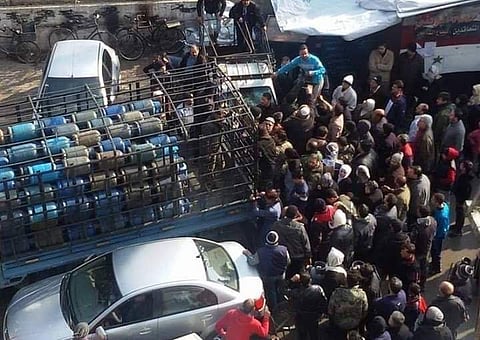Damascus feels pinch of Iran sanctions
Harsh winter has also made it difficult for government to meet people’s electricity needs

Damascus: Renewed US sanctions have hit the Iranian economy hard—and are starting to be felt strongly in Damascus as well.
In recent weeks, services and living conditions have sunk to an all-time low in the Syrian capital, triggered by a shortage of cooking gas, powdered milk, and electricity.
Government officials have had a tough time trying to explain why almost one year after the battles of East Ghouta, living conditions are far worst in Damascus than they were during the war years.
Syria used to produce its own cooking gas, but that facility in Adra, northeast of Damascus, was destroyed in the course of fighting.
Until last month, the lion’s share of cooking gas came from Iran but that source has started to dry up, due to sanctions as well as exceptionally harsh weather.as of late.
While cylinders typically cost 2,650 SP ($5.3 USD), they are now being sold on the black market for 7,000 SP ($14 USD).
“We are forced to import from Iran and raise production at other fields, up to 175 tons of cylinder gas/day. They haven’t met the market need, because of corruption and hoarding. Some private individuals buy 10-20 cylinders at subsidised prices, and then sell them on the black market,” a government source, speaking on condition of anonymity, told Gulf News.
Because of sanctions, Iranian-made baby’s powdered milk is not available.
This was the only affordable formula for infants below the age of 1.
Syria doesn’t produce the milk and had relied solely on Iran to meet market need, subsidising packages that used to sell for 2,800 SP/box ($5.4 USD).
Due to US sanctions, that line has also been severed, forcing Syrians to rely on smuggled powder milk from Lebanon.
“The prices are astronomically for this milk— anywhere between 12,000-14,000 SP/bottle ($24-28 USD),” said Hiba, a housewife.
Another problem is that the government now is responsible to provide for liberated territories, which in previous years, were in the hands of the armed opposition.
“In the past we were responsible for less territory and now demand is higher but our capabilities are the same,” the government source said.
Electricity shortage
Additionally, a chronic electricity problem has crept back upon Damascus, due to high demand for electric heating during the harsh winter.
The Ministry of Electricity—once promising that rationing was now a thing of the past—is back to its old practice, cutting electricity for 12-hours per day, at a 3-hour interval, throughout the city.
These are the first cuts in Damascus since regular electricity returned to the city in August 2017.
Syrians from all walks of life have been complaining about the sudden shortages.
Prominent actor Ayman Zeidan told Gulf News: “Victory has lost its meaning. Laurels of victory cannot be worn in darkness and frost. We want our Damascus back!”
Addressing government authorities, he added: “Don’t make us strangers in our country.”
His colleague Shoukran Murtaja, one of the stars of the popular drama Bab Al Hara, was equally outspoken, writing an open letter to President Bashar Al Assad. “Mr. President, people are tired” she wrote.
“Is it possible that those who did not die because of the war will die of agony, cold, and inflation?”



